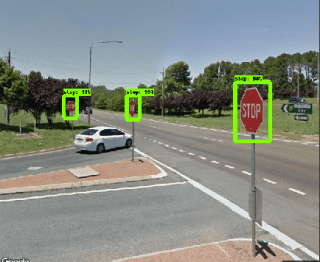Jun 19 2019
A new program to look for street signs requiring repair or replacement has been developed by geospatial researchers with the help of Google Street View images. The completely-automated system is taught using artificial intelligence (AI)-driven object detection to recognize street signs in the freely accessible images.
 The system identifies and classifies street signs from Google Street View images. (Image credit: RMIT)
The system identifies and classifies street signs from Google Street View images. (Image credit: RMIT)
Large amounts of money and time are spent by authorities at present to track and record the geo-location of traffic infrastructure manually, a task which also exposes personnel to avoidable traffic dangers.
Results published recently in the Journal of Computers, Environment, and Urban Systems reveal the system identifies signs with near 96% accuracy, identifies their type with almost 98% accuracy and can record their exact geo-location from the 2D images.
Study lead author and RMIT University Geospatial Science Honors student, Andrew Campbell, said the proof-of-concept prototype was taught to see “stop” and “give way” signs, but could be trained to recognize numerous other inputs and was easily scalable for use by traffic authorities and local governments.
Councils have requirements to monitor this infrastructure but currently no cheap or efficient way to do so. By using free and open source tools, we’ve now developed a fully automated system for doing that job, and doing it more accurately.
Andrew Campbell, Study Lead Author and Geospatial Science Honors student, RMIT University
The researchers learned during investigations that set GPS location data in current street sign databases was time and again inaccurate, at times up to 10 m off
“Tracking these signs manually by people who may not be trained geoscientists introduces human error into the database. Our system, once set up, can be used by any spatial analyst — you just tell the system which area you want to monitor and it looks after it for you,” Campbell said.
Campbell attributed the project’s preliminary concept to his industry mentor at Alpine Shire Council and RMIT Geospatial Science alumnus, Barrett Higman, as well as industry partner Spatial Vision.
Dr Chayn Sun, RMIT geospatial scientist and project co-lead, said the fact that a few councils were already fixing cameras onto garbage trucks to collect street footage revealed how beneficial visual data was becoming, given what technology could presently do with it.
This imagery is critical for local governments in monitoring and managing assets and with the huge amount of geospatial applications flourishing, this information will only become more valuable. Ours is one of several early applications for this to meet a specific industry need but a whole lot more will emerge in coming years.
Dr Chayn Sun, Geospatial Scientist and Project Co-Lead, RMIT
Sun said recordings from other sources, like that from garbage truck cameras or any other geo-referenced imagery of the road network gathered by councils, could also be added into the system.
“Where footage is already being gathered, our research can provide councils with an economical tool to drive insights and data from this existing resource,” she said.
The project was co-led by Sun and fellow RMIT geospatial scientist Dr Alan Both, from the university’s Centre for Urban Research.
RMIT team is presently involved with local governments on heat intervention strategies using Google Street View images to study street tree shade.